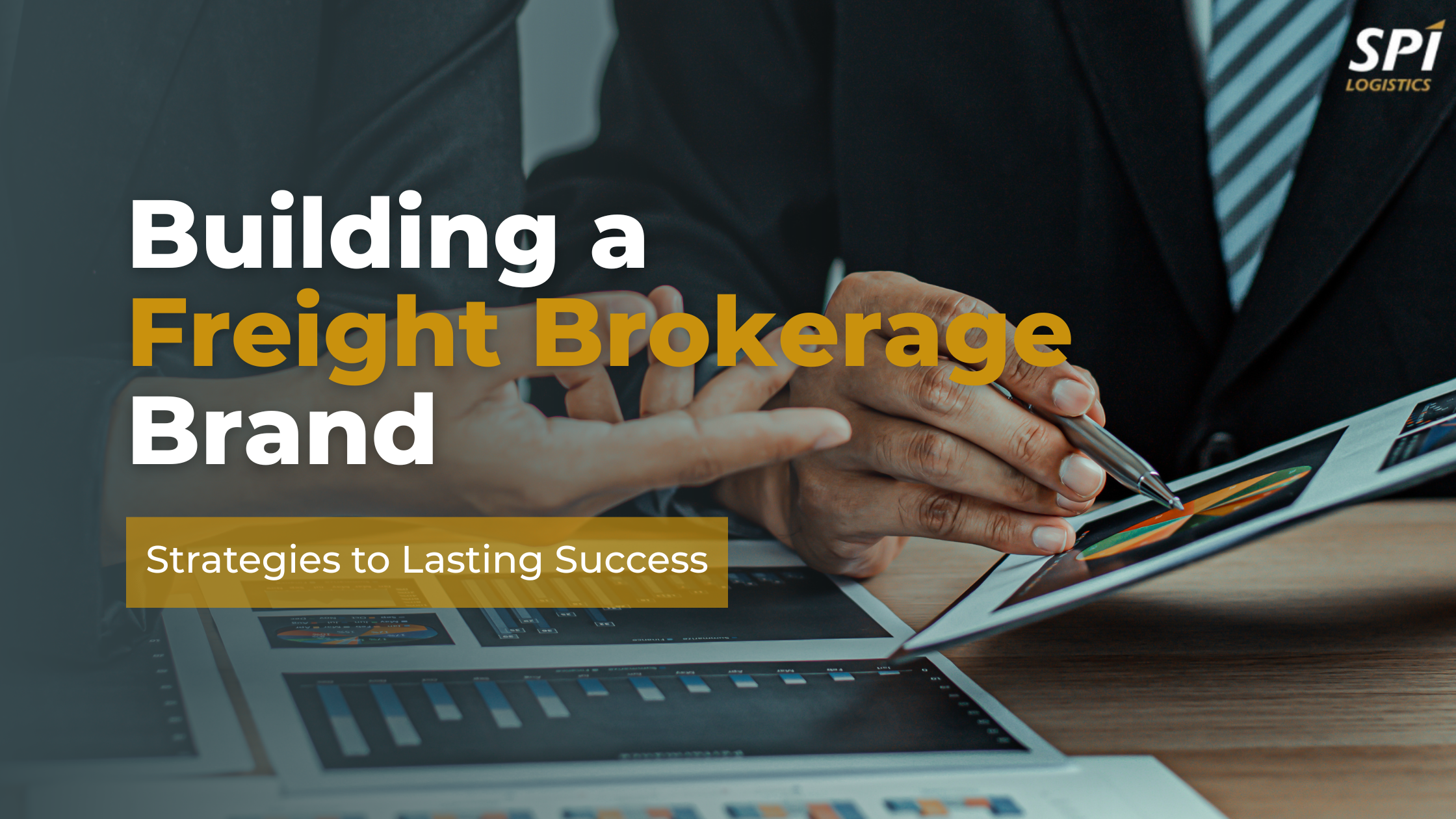In the freight brokerage industry, your reputation is your most valuable currency. Whether you’re an independent broker or part of a larger network, the strength of your brand directly impacts your ability to attract shippers, retain carriers, and command premium rates. A strong, trustworthy brand signals professionalism, reliability, and consistency, all crucial in a business where every load and relationship matters.
Below, we’ll explore actionable strategies to build a brand that stands out, earns loyalty, and thrives even in competitive markets.
Forge an Unforgettable Brand Identity
Creating a memorable brand identity is the foundation of reputation and trust in the freight brokerage industry (Forbes, n.d.). Whether you’re an independent broker or working for a small firm, the way your brand is perceived influences how shippers and carriers view you.
Steps & Ideas:
-
Define your unique value proposition (UVP)
- Identify what you do better or differently (e.g., niche lanes, expedited freight, exceptional communication).
- Write a short elevator pitch: “We connect mid-sized shippers in the X region with vetted carriers in under 24 hours.”
- Ensure all branding elements (logo, tagline, website headline) reflect that UVP.
-
Choose consistent brand elements
- Select a color palette, typography and logo that reflect professionalism, reliability and logistics expertise.
- Maintain the same tone of voice across channels (e.g., friendly but authoritative).
-
Tailor your personal vs. company brand
- If you’re an independent broker, treat your name and persona as part of the brand.
- Use your personal story, values and service promise to humanize the brand.
-
Embed brand in every customer touchpoint
- From your website, email signature, business card, voice mail greeting, to your carrier partner policies.
- Make sure every interaction reinforces that you are trustworthy, responsive and dependable.
-
Monitor and evolve the brand over time
- Conduct brand audits every 6–12 months: do your carriers and shippers perceive your brand as you intend?
- Adjust messaging if the market shifts or you move into a niche.
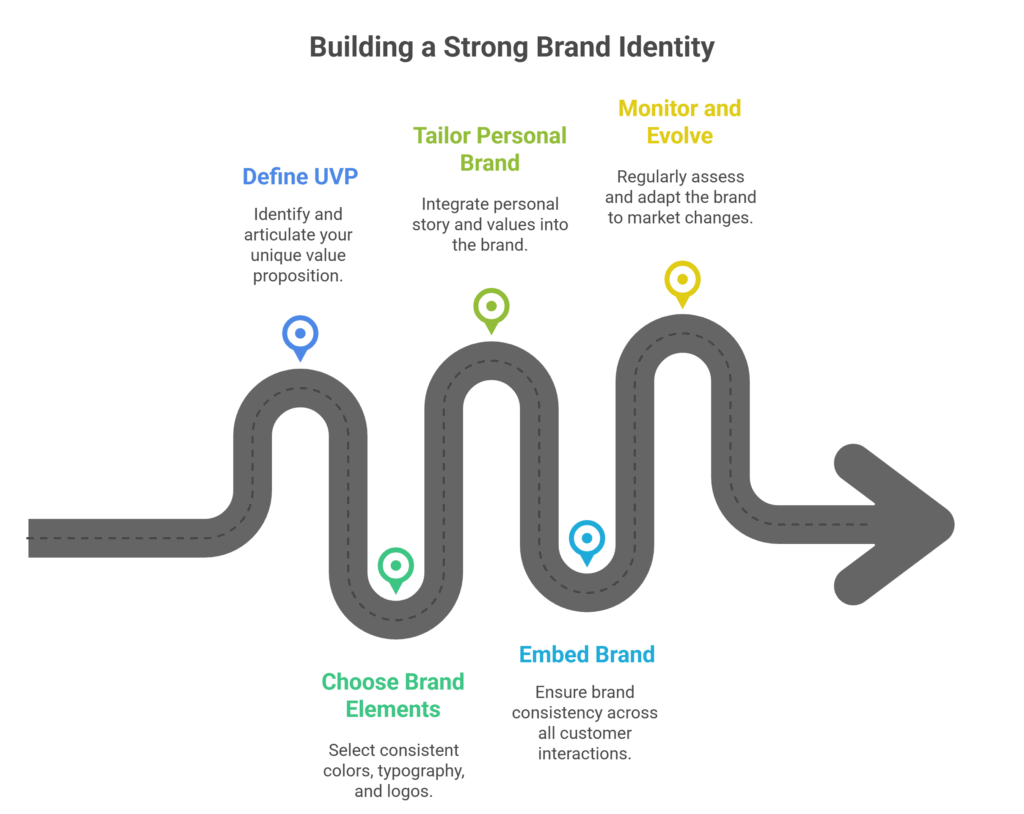
“Because the freight industry is so strongly relationship- and reputation-based. Nothing will put you out of business faster than the story of one bad transaction or one nasty court loss because of bad practices getting out into the marketplace.”
What one story or experience from your career could you feature in your brand messaging to humanize your brokerage and differentiate you from competitors?
Create a Professional, Credible Website That Converts Visitors into Clients
In the digital age, your website often serves as the first impression many shippers or carriers will have of your brokerage. A professional, effective website signals credibility and helps build trust.
Steps & Ideas:
-
Key pages your site must include
- Home page with clear headline: who you serve + how you help.
- About page: your story, credentials, professional photo, mission and values.
- Services page: specifics of what you offer (lanes, freight types, value adds).
- Testimonials or case studies: proven results or feedback from shippers/carriers.
- Contact page: clear call-to-action, phone, email, maybe live chat.
-
Design & usability fundamentals
- Mobile-friendly (responsive) as many users will view on phones.
- Fast load time, clean navigation, professional imagery (Inbound Logistics, n.d.).
- Use trust signals: your registration/license, insurance compliance, carrier vetting process.
-
SEO and content considerations
- Use relevant keywords such as “freight brokerage in [region]”, “independent freight broker”, “carrier-approved freight broker” etc.
- Include a blog or resource section with helpful content (e.g., industry updates, carrier tips) to build authority.
- Include schema markup if possible, and ensure metadata (title tags, descriptions) reflect your brand and services.
-
Showcase your unique selling points (USPs)
- If you specialise in a niche (e.g., refrigerated loads, oversized freight), highlight it clearly.
- If you focus on communication, reliability, trust, pay-on-time carriers, include those as bullet points or badges.
-
Regularly update and audit your site
- Keep your case studies fresh, update any licensing or insurance info.
- Monitor analytics: bounce rate, page views, conversions (contact form submissions) to see what works and what needs improvement.
“If you don’t have a site, you don’t exist in half the market. Your website is your digital storefront.”
What’s one section of your website that could be strengthened this week?
Leverage Social Media to Build Visibility and Industry Credibility
Social platforms like LinkedIn and Facebook are no longer optional for freight brokers. They serve as public windows into your professionalism, expertise and network (Logistics Management, n.d.). Proper use can elevate your visibility, credibility and engagement.
Steps & Ideas:
-
Choose your platform(s) wisely
- LinkedIn is ideal for B2B: shippers, carriers, logistics professionals.
- Facebook or Instagram may be useful for community building or niche-specific content (e.g., refrigerated freight groups).
- Ensure your profile is fully filled out: professional headshot, banner image, clear headline (“Independent Freight Broker | X lane specialist | Carrier-first service”).
-
Create consistent, value-driven content
- Post 2–3 times a week: insights on market trends, case studies, carrier/shipper tips.
- Engage in relevant groups (logistics forums, freight broker groups) by commenting, sharing, asking questions.
-
Build your network and credibility
- Connect with carriers you work with, shippers, other logistics professionals.
- Ask for recommendations on LinkedIn: from carriers you pay on time, shippers you’ve served reliably.
- Respond to messages promptly and follow up on comments to show responsiveness.
-
Monitor your online social reputation
- Set up Google Alerts or platform alerts for your name / company name.
- Reply to comments or inquiries in a timely manner.
- If negative comments appear, address them publicly (where appropriate) with professionalism.
-
Measure and refine your efforts
- Track metrics: engagement rate, connection growth, message responses.
- Identify what content resonates (case study vs. market commentary) and double down.
- Experiment with formats: short videos, infographics, polls, live Q&A.
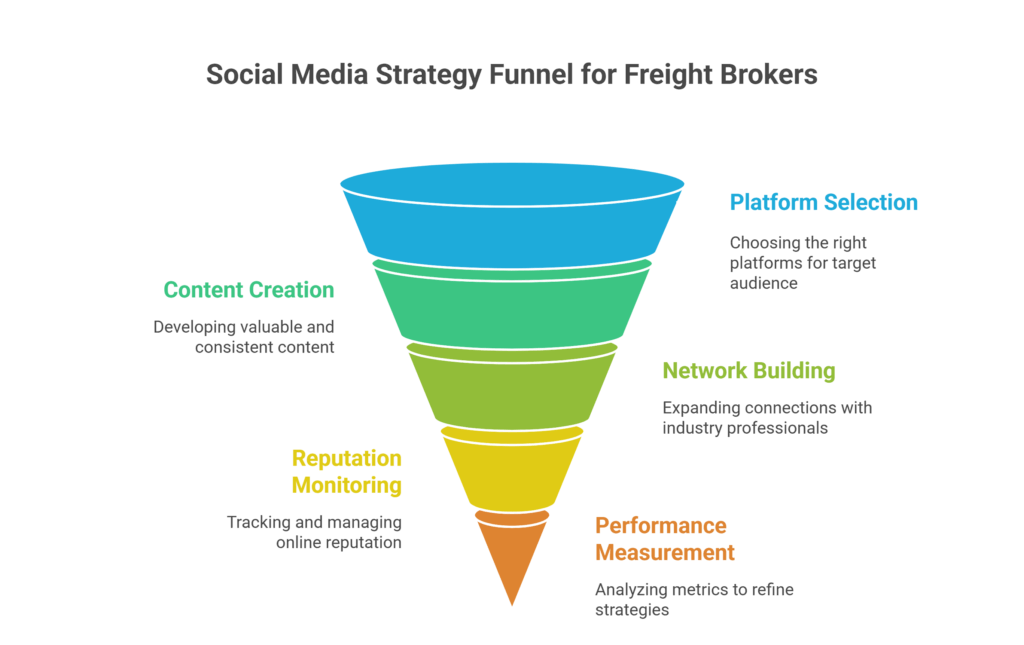
“Brokers who use LinkedIn as a knowledge hub build credibility faster.”
What topic could you post this week on LinkedIn that would both demonstrate your expertise and invite comments from carriers or shippers?
Gather and Showcase Testimonials to Reinforce Trust
Testimonials and case studies act as social proof, the concrete evidence that you deliver what you promise. For independent brokers especially, they help build trust quickly among new shippers and carriers.
Steps to build powerful social proof:
1. Request reviews immediately after successful loads when clients are most satisfied and likely to respond positively (Transportation Intermediaries Association [TIA], n.d.).
- Make it simple: provide a short template or questions to make it easy for them to respond.
2. Display testimonials on your website, LinkedIn, and marketing materials to build credibility.
- Use real names and company names (with permission). Authenticity builds trust.
- Refresh every 6–12 months: remove older testimonials if they no longer reflect your current services.
- If you move into a new niche, gather testimonials from clients/carriers in that niche.
3. Create short case studies highlighting specific client challenges you solved to demonstrate your reliability and results.
- Structure: challenge → solution → outcome (quantifiable if possible: e.g., reduced delivery delays by X% or saved $Y)
“Building authority through industry-specific blogs, testimonials, and case studies not only enhances trust but also positions the broker agent as a knowledgeable leader.”
Who’s one carrier or shipper you’ve worked with recently that could provide a testimonial, and what specific result or benefit would you ask them to highlight?
Manage Online Reviews Proactively to Protect Your Reputation
In an era of online research, both shippers and carriers check reviews and online reputation before engaging with a broker. Proactive management of reviews can make the difference between being selected or being ignored.
Steps to effectively manage online reviews:
-
Encourage positive reviews
- Provide direct links and simple instructions to make it frictionless(FreightWaves, n.d.).
-
Respond to positive reviews
- Thank the reviewer by name.
- Adds visibility and confirms you’re engaged.
-
Address negative reviews (with care and speed)
- Respond publicly where possible: acknowledge the issue, express regret, propose a resolution or request the reviewer to contact you offline.
- Don’t get defensive or dismissive, this can worsen reputation.
- Internally review what caused the negative feedback and implement improvements.
-
Monitor review platforms regularly
- Google My Business, LinkedIn recommendations, industry forums, any niche freight-brokerage discussion boards (FreightWaves, n.d.).
- Set up alerts for your name or company to stay on top of mentions
“Shippers aren’t looking for someone with just a truck and authority. They’re looking for partners. Carriers they can count on.”
How would you handle a negative review to turn it into a chance to strengthen your brand?
Build Credibility as a New or Small Independent Broker
If you’re new in the independent brokerage game or operating a smaller firm, building credibility quickly is critical. Without a long track-record, you must rely on trust signals, communication and niche expertise to stand out.
Steps to establish trust early:
- Highlight your compliance and professionalism: Display your registration/licensing, insurance certificates, bonding (if applicable) prominently.
- Focus on a niche or defined lane: Rather than “we do everything,” pick a lane or freight type and become known for it (FreightWaves, n.d.).
- Partner with reputable carriers and highlight them: Show that you have vetted carriers, pay carriers on time, and maintain high service standards.
- Showcase early wins and reliability: Even small successes matter: on-time delivery, last-minute load filled, tracking update etc. Publicize them (with permission).
- Network and build relationships: Attend trade shows, webinars, carrier meetups.
- Communicate transparently and often
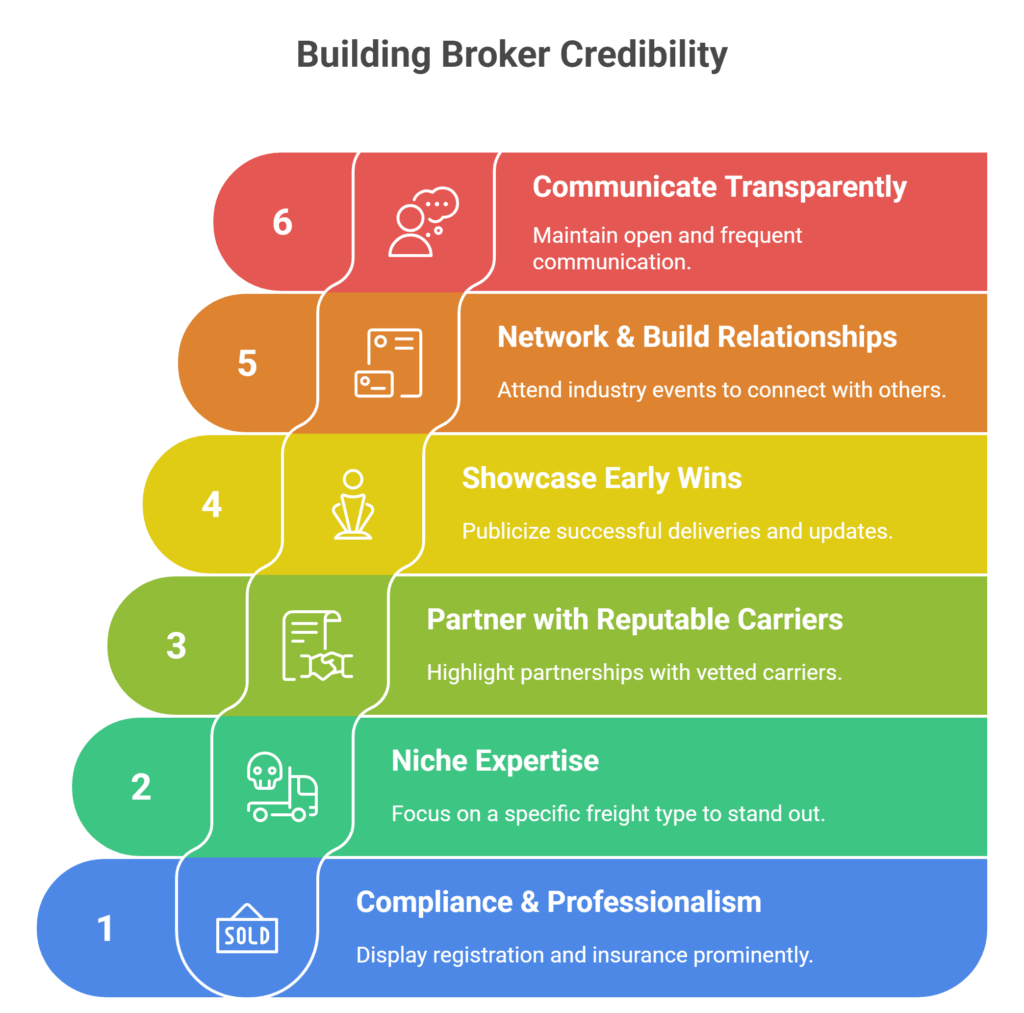
“Trust doesn’t depend on size, it depends on consistency. Even a solo broker can build an enterprise-level reputation.”
What’s the one trust signal you could publish this week that would help a shipper feel safer working with you?
Use Clear and Transparent Communication to Strengthen Relationships
Strong communication is the backbone of a reputable freight brokerage.
Key principles for effective communication:
- Set expectations early with shippers and carriers to avoid misunderstandings.
- Be proactive with updates and transparent about issues or delays.
- Maintain professionalism in tone, even under pressure.
“Every email, call, or update is a reflection of your brand. Consistency in communication defines reliability.”
Looking for ways to communicate effectively and build trust as a freight broker? Discover What Successful Freight Agents Do Different to strengthen relationships and maintain credibility by visiting.
Specialize in a Freight Niche to Strengthen Your Brand Identity
Specializing in a specific freight niche can sharpen your brand identity, differentiate you from generalist brokers, and allow you to build deeper trust among shippers and carriers who operate in that niche.
Steps to niche specialization:
-
Select your niche carefully
- Consider freight type (reefer/perishables, oversized/flatbed, hazardous materials), region (East–West, cross-border), or client type (e-commerce, manufacturing).
- Research supply and demand, your experience/contacts in that niche.
-
Build specialized expertise and credibility
- Stay current on niche-specific regulations, carriers, service requirements.
- Create content (blog, LinkedIn posts) around challenges and solutions in your niche.
-
Tailor your branding and marketing to the niche
- Use imagery, terminology, and case studies relevant to that niche.
-
Develop relationships specific to the niche
- Engage with carriers that specialize in that freight type.
- Join niche-specific associations or forums.
- Attend trade events focused on that niche.
- Leverage your niche credibility to grow
“Specialization turns visibility into authority, and authority into high-value opportunities.”
Which freight niche could you dominate based on your existing experience or connections?
Avoid Common Pitfalls That Damage Reputation
Even small mistakes can cause major reputational damage.
Critical pitfalls to avoid:
- Delayed payments or poor carrier relations can lead to online complaints that spread quickly.
- Overpromising and underdelivering erode long-term client confidence.
- Associating with unethical partners can damage credibility by association.
“Reputation is built load by load, but one bad transaction can erase months of progress.”
What internal checks can you implement to protect your brokerage from reputation risks?
Differentiate Your Brand from Larger Competitors
In a marketplace crowded with large brokerages and independent operators, clearly distinguishing your brand is essential. Differentiation helps you attract the right clients and partners who value what you uniquely offer (TIA, n.d.).
Ways to differentiate effectively:
-
Articulate what makes you different
- Are you more personal? Faster response times? Niche-expertise? Transparent pricing?
- Express that in your tagline, value proposition, marketing copy.
-
Showcase your personal touch and agility
- As an independent broker you often have more flexibility, quicker decisions, closer relationships. Highlight that.
- Use real-life stories (“When a carrier cancelled, we stepped in within 2 hours and kept the shipper on schedule”).
-
Brand visually and verbally for distinction
- Your logo, website design, tone of voice should reflect your niche and personality, not look generic.
-
Offer services or extras the big players can’t match
- Perhaps you provide personalised carrier onboarding, fewer layers, direct contact with you as the broker.
- Maybe you specialise in underserved lanes, or provide more frequent updates or VR tracking.
“In freight, differentiation isn’t about being bigger, it’s about being remembered for reliability.”
Looking for strategies to scale your freight brokerage while standing out in a crowded market? Learn How to Scale Your Freight Brokerage to differentiate your brokerage and grow efficiently
Build Your Brand Through Strategic Networking
Networking, both online and offline, amplifies visibility and trust.
Steps to expand your professional presence:
- Attend logistics expos, trade shows, or webinars to meet potential partners (TIA, n.d.).
- Join LinkedIn industry groups and actively contribute insights.
- Maintain a database of professional contacts for long-term relationship building
“Networking turns awareness into opportunity, every handshake or connection builds brand equity.”
How can you expand your current network to reach more qualified shippers and carriers?
Deliver on Promises to Build Long-Term Loyalty
The most powerful brand-building strategy remains simple: deliver what you promise, every time.
Steps to maintain operational excellence:
- Define your service promises: What do you guarantee? On-time pickup? Real-time updates? Carrier payment within X days?
- Measure performance against your promises: Track metrics like on-time rate, carrier payment reliability, load booking accuracy, number of communication lapses (TIA, n.d.).
- Implement continuous improvement processes: When a metric dips (e.g., late delivery), investigate root cause and implement corrective measures.
- Celebrate and communicate your successes: Acknowledge carriers/shippers who help you deliver excellence.
- Maintain transparency when issues occur: If a commitment fails, proactively notify the shipper/carrier, explain what happened, and what you’re doing to fix it.
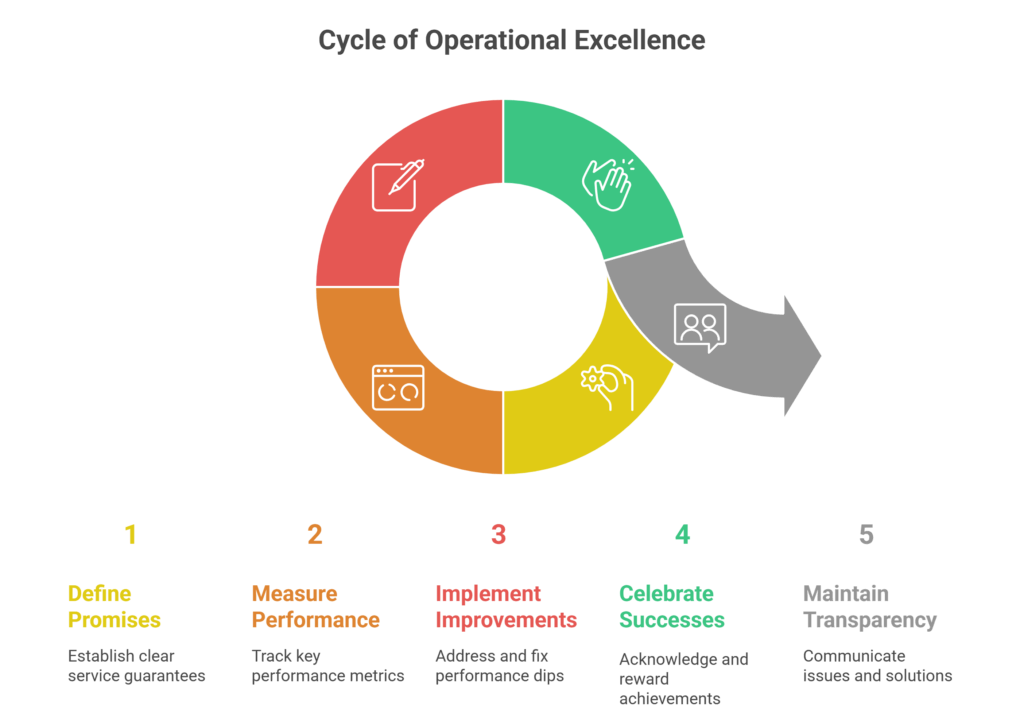
“Brand loyalty isn’t bought, it’s earned through consistent execution and honest service.
How can you reinforce your brand promise through operational excellence?
Turning Reputation into Revenue
Your brand is more than a logo, it’s the sum of every promise kept, every carrier paid on time, and every shipper who trusts you with their freight. A strong, credible reputation doesn’t just attract business; it compounds over time, turning satisfied clients into loyal advocates and your name into a symbol of reliability. By defining your identity, maintaining transparency, communicating proactively, and consistently delivering value, you position your brokerage as a trusted partner, not just another intermediary.
Ready to strengthen your brand and reputation in freight? Contact us to build lasting trust with shippers and carriers and turn your freight brokerage’s reputation into long-term revenue.
Frequently Asked Questions(FAQs)
1. How can I build trust quickly as a new freight broker?
Start small by being transparent, keeping promises, and communicating proactively. Each successful load strengthens your reputation.
2. Which social media platforms are most effective for freight brokers?
LinkedIn is ideal for B2B networking, while Facebook can help with community engagement and brand storytelling.
3. How do I recover from a bad online review?
Acknowledge the feedback, address the issue professionally, and showcase the steps you’ve taken to improve. Authentic responses often rebuild more trust than silence.
References
- Forbes. (n.d.). Branding strategies for small businesses. Retrieved from Learn more
- Inbound Logistics. (n.d.). Digital marketing and logistics. Retrieved from Learn more
- Logistics Management. (n.d.). Social media for logistics companies. Retrieved from Learn more
- Transportation Intermediaries Association. (n.d.). Best practices for freight brokers. Retrieved from Learn more
- FreightWaves. (n.d.). Reputation management in logistics. Retrieved from Learn more

